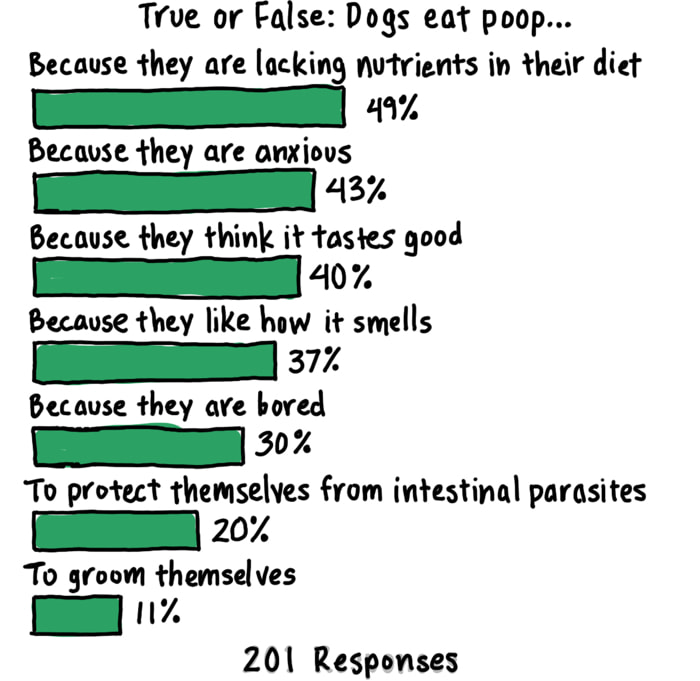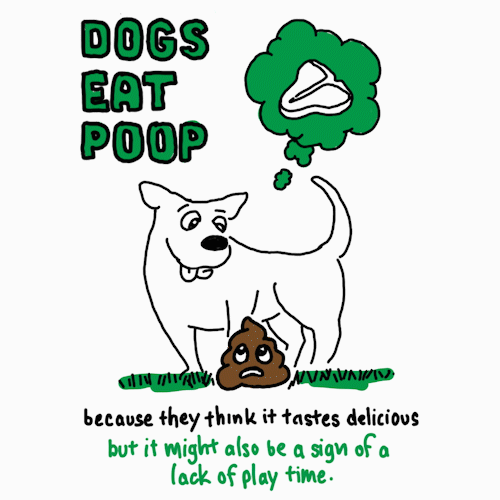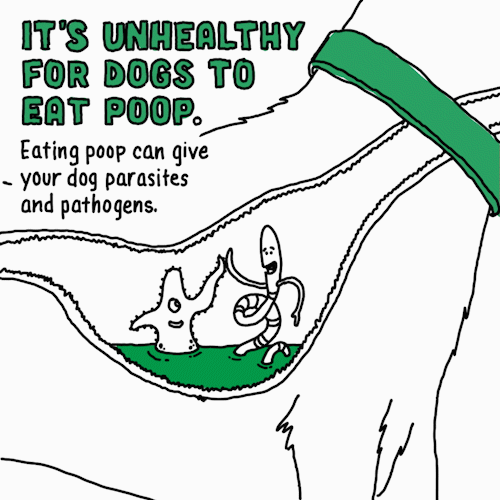

Like any companion or roommate, dogs — for all their love and cuteness—have habits we just don’t understand. One question dog owners often ask their pets: “Why? Why would you eat poop?”

When we polled* dog owners recently, most thought it was because a dog is lacking nutrients (49%), they’re anxious (43%) or they just think it tastes good (40%).
Dogs are significantly more likely to eat the droppings of another species (e.g., horses, rabbits) than their own.
We held our noses and got to the bottom of the issue with the help of some experts.
While those in our poll thought this was the number-one reason for the behavior, it has actually never been proven. “It’s a myth dogs eat poop because they’re seeking nutrients they aren’t getting. There’s no evidence to back this,” says
Opens a new windowDr. Jo Gale, BVetMed CertLAS MRCVS, Senior Manager, Global Science Advocacy at Waltham Petcare Science Institute.

According to Opens a new windowDr. Tammie King, Applied Behavior Technical Leader at Waltham Petcare Science Institute, “It can occur where there is lack of environmental enrichment. You see this often in dogs who are kenneled and have a lack of opportunity to exhibit normal canine behavior.” So if you need another excuse to get out and play with your pooch, this is a good one.
Believe it or not, this is the main reason dogs eat poop. Dr. Jo Gale explains: “Dogs are scavengers by nature and use any opportunity to eat what they can, when they can. They consider it a ‘tasty snack.’” Dr. Tammie King adds that “[Dogs eating poop] is a learned behavior. They’ve done it, enjoyed it, and that behavior is repeated.”
We love our dogs so much that we’re willing to trust our best friends on this. Maybe we should come out with a line of doggie breath mints though. Hmm.

“Ingesting feces from any animal increases potential for ingesting parasites and pathogens,” cautions Opens a new windowDr. James Serpell BSc, Phd Professor of Humane Ethics & Animal Welfare at University of Pennsylvania School of Veterinary Medicine. He went on to say, “[It’s] not something humans should ignore, but it's not worth getting too excited about it.”
All the experts we consulted said that if your dog occasionally eats poop, it’s nothing to be overly alarmed by. Just keep an eye on the frequency and their overall health. And as always, make sure they’re getting a nutritious diet and plenty of exercise and attention. If you have any concerns contact your vet.
Despite dogs liking the taste of poop, we’re going to stick with the healthy range of more traditional flavors offered in all IAMS dog foods.
*Surveyed U.S. dog owners, age 18+
Sample Size: n=201
Fielded May 8 to May 10, 2020


One essential component often overlooked in dogs’ diets is Vitamin C, a vital nutrient that plays a crucial role in their overall well-being. Understanding the benefits and proper dosage of Vitamin C for dogs can significantly contribute to their immune system, joint health, and overall vitality. In this blog, we will delve into the importance of incorporating Vitamin C into your canine companion's diet and how it can positively impact its long-term health and happiness.
Vitamin C, commonly known as ascorbic acid, is a vital nutrient that acts as the body's all-round defender and repair agent. This water-soluble superhero does wonders, promoting healthy bones, aiding in wound healing, and giving the immune system the strength, it needs to ward off pesky infections. Imagine it as the secret ingredient in the recipe for a robust and thriving body. It is abundantly present in a variety of tasty treats like juicy oranges, tangy strawberries, and vibrant bell peppers, making it a delicious and essential part of a well-balanced diet.
While our furry friends have the ability to produce their own vitamin C, there are times when they could use a little of this nutrient. Whether they are feeling a bit under the weather, entering their golden years, or experiencing significant life changes, a dash of vitamin C can provide the boost they need.
But when on the journey of learning if vitamin C is good for dogs, remember that like any good thing, too much can sometimes lead to an upset tummy or unwanted interactions with their medications. So, before you start loading up their bowls with citrus delights, it is always wise to have a chat with your trusted vet. With the right guidance, vitamin C can be the ultimate sidekick in your dog's quest for a vibrant and happy life.
Vitamin C is not just for humans; it can work wonders for our canine companions too. Vitamin C benefits for dogs range from bolstering their immune system to aiding in injury recovery. This superhero nutrient has a range of benefits that can significantly improve a dog's overall well-being in the following ways:
Research into the effects of vitamin C supplementation in canines suggests potential benefits worth considering:
However, while the scientific data presents promising insights, the application of vitamin C in canine diets should be approached with caution. Individual variations in metabolism and health conditions may influence the efficacy and tolerability of vitamin C supplementation in dogs. Consulting a veterinary professional to determine appropriate dosages and the suitability of supplementation based on a dog's specific health needs remains imperative for a safe and effective approach to integrating vitamin C into their regimen.
When it comes to ensuring your dog's optimal vitamin C intake, understanding the various supplement forms and appropriate dosages is crucial for their overall well-being. Here is a list of some:
Each of these supplement forms offers distinct benefits and flexibility, allowing pet parents to choose the most suitable option based on their dog's preferences and specific dietary requirements. It is important to consult a veterinarian to determine the most appropriate form and dosage for a dog's individual health and wellness needs.
Vitamin C holds a vital position in the realm of canine health, serving as a cornerstone for a well-functioning immune system and efficient tissue mending. Its multifaceted role in bolstering the body's defence mechanisms and fostering speedy recovery is essential in promoting a dynamic and thriving life for our canine companions. By contributing to the maintenance of robust connective tissues and actively participating in the repair of wounds, vitamin C proves indispensable in ensuring the sustained well-being and vitality of our beloved furry friends, underscoring the importance of its incorporation into their daily regimen.
As a key player in bolstering the immune system, promoting collagen synthesis, and providing essential antioxidant benefits, vitamin C plays a vital role in maintaining a dog's overall resilience. However, it is crucial to approach its supplementation with caution, consulting a veterinarian to determine the appropriate dosage and form suitable for your dog's specific needs. With mindful consideration and proper guidance, integrating vitamin C into your dog's diet can be a proactive step in fostering their long-term health and happiness. Regular monitoring and adjustments, alongside a balanced diet and ample exercise, contribute to a holistic approach in ensuring your beloved canine companion leads a vibrant and fulfilling life.


One essential component often overlooked in dogs’ diets is Vitamin C, a vital nutrient that plays a crucial role in their overall well-being. Understanding the benefits and proper dosage of Vitamin C for dogs can significantly contribute to their immune system, joint health, and overall vitality. In this blog, we will delve into the importance of incorporating Vitamin C into your canine companion's diet and how it can positively impact its long-term health and happiness.
Vitamin C, commonly known as ascorbic acid, is a vital nutrient that acts as the body's all-round defender and repair agent. This water-soluble superhero does wonders, promoting healthy bones, aiding in wound healing, and giving the immune system the strength, it needs to ward off pesky infections. Imagine it as the secret ingredient in the recipe for a robust and thriving body. It is abundantly present in a variety of tasty treats like juicy oranges, tangy strawberries, and vibrant bell peppers, making it a delicious and essential part of a well-balanced diet.
While our furry friends have the ability to produce their own vitamin C, there are times when they could use a little of this nutrient. Whether they are feeling a bit under the weather, entering their golden years, or experiencing significant life changes, a dash of vitamin C can provide the boost they need.
But when on the journey of learning if vitamin C is good for dogs, remember that like any good thing, too much can sometimes lead to an upset tummy or unwanted interactions with their medications. So, before you start loading up their bowls with citrus delights, it is always wise to have a chat with your trusted vet. With the right guidance, vitamin C can be the ultimate sidekick in your dog's quest for a vibrant and happy life.
Vitamin C is not just for humans; it can work wonders for our canine companions too. Vitamin C benefits for dogs range from bolstering their immune system to aiding in injury recovery. This superhero nutrient has a range of benefits that can significantly improve a dog's overall well-being in the following ways:
Research into the effects of vitamin C supplementation in canines suggests potential benefits worth considering:
However, while the scientific data presents promising insights, the application of vitamin C in canine diets should be approached with caution. Individual variations in metabolism and health conditions may influence the efficacy and tolerability of vitamin C supplementation in dogs. Consulting a veterinary professional to determine appropriate dosages and the suitability of supplementation based on a dog's specific health needs remains imperative for a safe and effective approach to integrating vitamin C into their regimen.
When it comes to ensuring your dog's optimal vitamin C intake, understanding the various supplement forms and appropriate dosages is crucial for their overall well-being. Here is a list of some:
Each of these supplement forms offers distinct benefits and flexibility, allowing pet parents to choose the most suitable option based on their dog's preferences and specific dietary requirements. It is important to consult a veterinarian to determine the most appropriate form and dosage for a dog's individual health and wellness needs.
Vitamin C holds a vital position in the realm of canine health, serving as a cornerstone for a well-functioning immune system and efficient tissue mending. Its multifaceted role in bolstering the body's defence mechanisms and fostering speedy recovery is essential in promoting a dynamic and thriving life for our canine companions. By contributing to the maintenance of robust connective tissues and actively participating in the repair of wounds, vitamin C proves indispensable in ensuring the sustained well-being and vitality of our beloved furry friends, underscoring the importance of its incorporation into their daily regimen.
As a key player in bolstering the immune system, promoting collagen synthesis, and providing essential antioxidant benefits, vitamin C plays a vital role in maintaining a dog's overall resilience. However, it is crucial to approach its supplementation with caution, consulting a veterinarian to determine the appropriate dosage and form suitable for your dog's specific needs. With mindful consideration and proper guidance, integrating vitamin C into your dog's diet can be a proactive step in fostering their long-term health and happiness. Regular monitoring and adjustments, alongside a balanced diet and ample exercise, contribute to a holistic approach in ensuring your beloved canine companion leads a vibrant and fulfilling life.